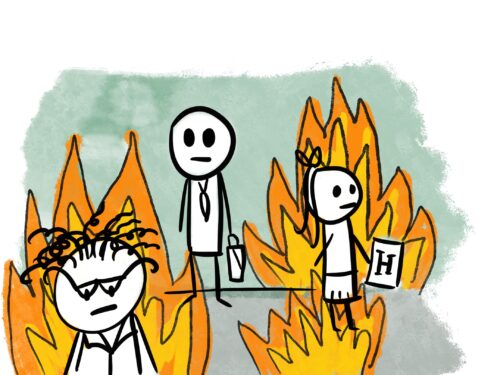In the pages of last year’s Love Issue in The Harvard Independent, Layla Chaaraoui ’26 argued that the frenetic flurry of semesterdom—the “Harvard bubble”—serves for too many students as a shield against the myriad of crises, tragedies, and catastrophes happening everywhere in the world. She asserted that we ought to leverage the power of our unique bubble and its 50 billion dollar endowment towards stopping that terribleness, or at least work towards limiting it as best we can.
Chaaraoui touched on perhaps the most critical issue of our time but misdiagnosed the cause of its symptoms. Any supposed apathy to the issues in the world around us which she identified does not stem from any Harvard bubble—whether that term refers to the rush of commitments and activities on campus or the privileged status we have to spend eight semesters in the ivory tower of academia. Instead, a broader American, Gen Z, 21st-century bubble dampens our collective spirit. Raised in an era of seemingly insurmountable challenges and political gridlock, we are not indifferent, but paralyzed—a generation all too aware of the world’s problems yet stunted by a disillusionment so pervasive it transcends campus boundaries.
My primary concern with blaming Harvard for low attendance at social justice club meetings is that it falsely implies a uniquely disengaged student body. While matriculates here may have fuller Google Calendars than other students, very few universities are hotbeds of political activism; we don’t see news being made about mass student sit-ins anywhere of the sort endemic in the 1970s around the Vietnam War. The closest analogue I participated in were high school walkouts in protest of gun violence, which resulted in no legislative change; indeed, 2023 is likely to set a new high for incidence of mass shootings. Recently such movements simply do not make substantive change.
While discussing the idea for this article, some argued that a sense of impending doom is nothing new—every generation feels the world is on the brink of collapse. To some extent, this is true. Whether it’s religious folks adhering to a moral code in preparation for an apocalypse or climate activists today working tirelessly to prevent environmental collapse, some fear an imminent end and act accordingly.
Yet our generation is unique. We’re not grappling with the terror of a quick, apocalyptic end; rather, we’re faced with a slow, seemingly inevitable decay. It’s as if we’re passengers on a train that is derailing at an agonizingly slow pace. The engineers in control have no intention of surrendering the wheel. So what does this reality inspire? Not action to prevent the disaster, but a grim resolve to maximize personal gain before the whole thing comes crashing down.
Consider a quick inventory of the major crises we grew up hearing about and the “progress” we have made in solving them. Most students now enrolled in the College were born after 9/11/2001; I saw recognition of this year’s anniversary exclusively on Instagram. We don’t understand the emotional reaction of our parents; instead, we see that the American invasion of Afghanistan spanned our generation’s most formative years with few positive results.
The political system seems broken, too; Donald Trump’s supporters voted for him because they agreed when he said the swamp needed draining, and those who don’t support him view his victory as impossible in a healthy democracy. Joe Biden, while an incredibly competent president, does not have the dynamism required to counteract the distrust he encounters. Barack Obama had the opportunity to inspire hope—indeed, that was his platform—but the gridlock he faced in Congress prevented him from accomplishing nearly any of his lofty goals. The one exception, Obamacare, reformed our privatized healthcare system which ought to be done away with entirely.
Even beyond the very real proliferation of systemic failings around us, social media ensures that we see an unprecedented degree of devastation—from individual instances of police brutality to entire villages and towns wiped out by natural disaster. I cannot imagine that many Harvard students have not heard about the recent wildfires in Maui, for example. Push notifications alone prevent any “bubble” from truly sheltering students here. The onslaught of tragedy stretches the limits of our empathy, desensitizing and disheartening.
On net, though, the increased awareness may well be a positive. In a thoroughly unscientific survey, more students than I expected conveyed hopes of fixing things—not through public institutions, however, but private enterprise. The reasoning views money as the ultimate source of power; by going into business, which rewards speed and efficiency, one can make a real impact in some important field without running into the foundational issues plaguing the political process; one can also make a bunch of money; with a bunch of money, one can acquire political influence and start fixing foundational issues.
Ultimately, though, more super-rich philanthropists cannot save us. Only we can, through broad engagement in the political process. Any solution to our generational malaise requires collective effort based upon mutual respect—a recognition by every individual that we all do better, together, and that we have a clear incentive for collaborative problem solving. People will disagree about solutions. That is both inevitable and good. It provides the opportunity to rigorously discuss and test out our ideas against each other, ensuring that the decided-upon remedies enjoy shared recognition as the best option. Such a process can only happen in a forum that recognizes and respects the basic rights of all its participants, with a regimented system for redress when rights are violated, where all opinions can be voiced and judged accordingly; it can only happen in a representative democracy. And thanks to a history of successful struggles—from suffragettes to civil rights—we live in one where ultimate power does lie in the voting booth, in the people. Our government can function, as long as those it represents care enough to make it do so.
Jude Herwitz ’25 (jherwitz@college.harvard.edu) watches Instagram Reels and calls them TikToks.

